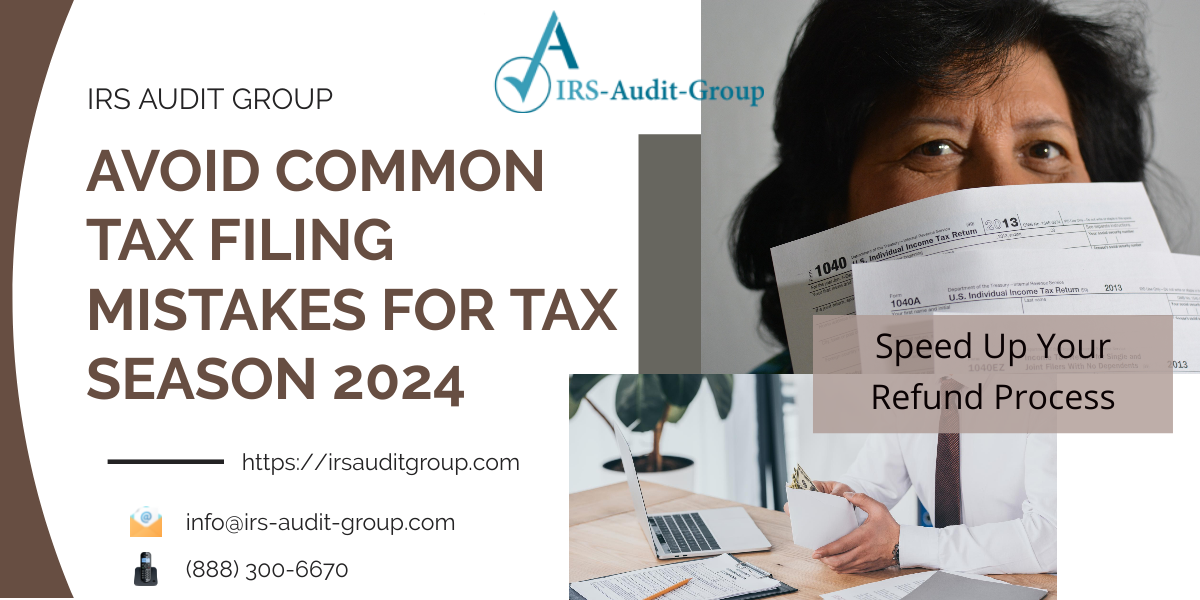The Internal Revenue Service (IRS) has instructed taxpayers to avoid errors on their federal tax returns and expedite their refunds for the Tax Season. These guidelines aim to assist in submitting returns that are thorough, precise, and free of mistakes. To help you navigate through Tax Season 2024 smoothly, here are some tips to avoid tax return mistakes and optimize your refund.
GATHER ALL TAX DOCUMENTS
Start gathering all necessary documents well before the 2024 tax filing deadline. This includes W-2 forms, 1099s, receipts for deductions, investment statements, and any other relevant financial documents. Having everything organized will make the tax preparation process much smoother and reduce the chances of overlooking important information.
USE ELECTRONIC FILING
The IRS recommends that taxpayers and their tax professionals leverage electronic filing channels, including IRS Free File or other certified e-file service providers. Furthermore, certain taxpayers in 12 States have the option to participate in the Direct File pilot program. Electronic filing offers the advantage of reducing mathematical inaccuracies and pinpointing potential tax credits or deductions for which the taxpayer may be eligible. It is imperative for taxpayers to conduct a thorough review of their tax returns to guarantee precision and compliance. Electing electronic filing and opting for direct deposit represent the most expeditious and secure methods to receive refunds.
USE THE CORRECT FILING STATUS
Tax software platforms are designed to mitigate errors by guiding users through the selection process of their tax return filing status. For this tax season 2024, individuals who are uncertain about their appropriate filing status can utilize the Interactive Tax Assistant available on IRS.gov. This tool aids individuals in determining the correct filing status, especially in situations where multiple statuses may be applicable.
DOUBLE-CHECK PERSONAL DETAILS
Taxpayers are required to provide precise information including the name, date of birth, and Social Security number (SSN) for each dependent listed on their individual income tax return. It is imperative that the SSN and individual’s name are entered accurately, reflecting the information as it appears on the Social Security card. In instances where a dependent or spouse does not possess an SSN and is ineligible to acquire one, an assigned Individual Taxpayer Identification Number (ITIN) should be furnished in place of the SSN.
FILE YOUR DIGITAL ASSETS TRANSACTIONS
All filers of Forms 1040, 1040-SR, 1040-NR, 1041, 1065, 1120, and 1120S must indicate their response to the digital asset question by selecting “Yes” or “No”. This question must be addressed by all taxpayers, irrespective of whether they participated in digital asset transactions during the tax year 2023. Furthermore, taxpayers are obligated to report all income derived from digital asset transactions.
For comprehensive guidelines regarding when to affirm “yes” and instructions on reporting digital asset-related income, individuals are advised to refer to the IRS.gov Digital Assets section.
REPORT ALL TAXABLE INCOME
Failure to report income may result in penalties and interest. Income tax information can help prevent errors that slow down the process and help find missed deductions or credits. Taxpayers should have all their income information ready before they begin filing their taxes. IRS can even conduct tax audits on such filings and may ask for further documents or even visit the premises for field audits.
DOUBLE CHECK ROUTING AND ACCOUNT NUMBERS
Taxpayers have the flexibility to choose to have their federal income taxes deposited into one, two, or three accounts of their choice. Bank documentation containing correct numbers and account numbers is important, especially when a refund is required, to reduce the risk of delays or the refund being sent to an undesirable location. Taxpayers also have the opportunity to use their refunds to purchase US Savings Bonds, thus making the most of their tax refunds.
SIGN AND DATE THE TAX FILINGS
If filing a joint tax return, both spouses must sign and date the document. For those independently preparing and electronically submitting their taxes, authentication involves entering the adjusted gross income (AGI) from the previous year. Taxpayers seeking guidance can consult resources like “Validating Your Electronically Filed Tax Return” for assistance with any questions they may have.
ACCURATE MAILING ADDRESS
Taxpayers and tax professionals are urged to opt for electronic filing whenever possible. However, if a paper tax return must be submitted, it’s vital to confirm the accurate mailing address. This verification can be carried out on the official IRS website, IRS.gov, or by referring to the instructions provided with Form 1040. This precautionary step is essential for minimizing processing delays caused by incorrect mailing addresses.
KEEP A COPY
After completing their tax filing, individuals should proactively produce duplicates of their signed returns and any accompanying schedules for their records. Maintaining these copies simplifies future tax preparations and assists in revising calculations, especially when filing amended returns. Moreover, it is recommended that taxpayers hold onto records supporting their reported income, deductions, or credits until the statutory period for that specific tax return expires. This proactive approach ensures adherence to regulatory standards and streamlines potential inquiries or audits by tax authorities.
IRS AUDIT GROUP
IRS Audit Group consists of tax professionals, CPAs, enrolled agents, and tax attorneys. We are located in Los Angeles; California and our primary area of expertise is IRS Tax Audit Representation. However, our certified professionals cooperate and work with all IRS offices across the country. Please contact us for more information. https://irsauditgroup.com/contact/
Toll Free: (888) 300-6670
Emergency Number: (310) 498-7508

